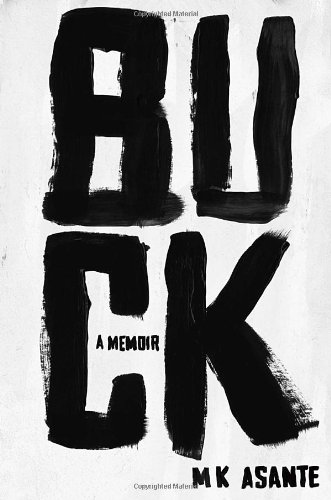
Buck
A Memoir
کتاب های مرتبط
- اطلاعات
- نقد و بررسی
- دیدگاه کاربران
نقد و بررسی

Starred review from June 24, 2013
In his memoir, Asante, a Zimbabwe native and a Philly transplant, plays out the events of his childhood against the backdrop of the street-savvy rhythms of hip hop. In this soul-searching memoir, Asante describes himself as a “true African-American,” born in the motherland, and he recalls his family life in “Killadelphia” with his Afrocentric “Pops” and slightly off-kilter “Moms,” who winds up in a psychiatric facility, as well as his older brother Uzi, who goes to prison for the statutory rape of a white girl. Asante blends the old soul riffs of Amiri Baraka and Ishmael Reed with the helter-skelter stream-of-consciousness of New Journalism scribes Hunter Thompson, Terry Southern, and Tom Wolfe, tossing in a dash of Sister Soulja and Donald Goines, in his journey through the crime-ridden city streets. It’s the snippets of scenes—almost overheard chatter—and colorful descriptions that make this memoir memorable, as in his description of the funeral of Amir, the riff on the all-important “dead presidents” or money on the block, and his time at Crefeld alternative school. Asante’s noir chronicle is imaginative, powerful, and electric, written with passion and conviction.

July 15, 2013
A young black man's self-destructive arc, cut short by a passion for writing. Asante's (It's Bigger than Hip-Hop, 2008, etc.) memoir, based on his teenage years in inner-city Philadelphia, undoubtedly reflects the experiences of many African-American youngsters today in such cities. By age 14, the author was an inquisitive, insecure teen facing the hazards that led his beleaguered mother, a teacher, to warn him, "[t]hey are out there looking for young black boys to put in the system." This was first driven home to Asante when his brother received a long prison sentence for statutory rape; later, his father, a proud, unyielding scholar of Afrocentrism, abruptly left under financial strain, and his mother was hospitalized after increasing emotional instability. Despite their strong influences, Asante seemed headed for jail or death on the streets. This is not unexplored territory, but the book's strength lies in Asante's vibrant, specific observations and, at times, the percussive prose that captures them. The author's fluid, filmic images of black urban life feel unique and disturbing: "Fiends, as thin as crack pipes, dance--the dancing dead....Everybody's eyes curry yellow or smog gray, dead as sunken ships." Unfortunately, this is balanced by a familiar stance of adolescent hip-hop braggadocio (with some of that genre's misogyny) and by narrative melodrama of gangs and drug dealing that is neatly resolved in the final chapters, when an alternative school experience finally broke through Asante's ennui and the murderous dealers to whom he owed thousands were conveniently arrested. The author constantly breaks up the storytelling with unnecessary spacing, lyrics from (mostly) 1990s rap, excerpts from his mother's journal, letters from his imprisoned brother, and quotations from the scholars he encountered on his intellectual walkabout in his late adolescence. Still, young readers may benefit from Asante's message: that an embrace of books and culture can help one slough off the genuinely dangerous pathologies of urban life. Asante is a talented writer, but his memoir is undernourished.
COPYRIGHT(2013) Kirkus Reviews, ALL RIGHTS RESERVED.

Starred review from July 1, 2013
In this bruising memoir, author, filmmaker, and professor Asante recalls his troubled youth in Philadelphia, or, as he calls it, Killadelphia, Pistolvania. The story begins with Asante's older brother, Uzi, being placed under arrest. Asante, nicknamed Malo and all of 12 at the time, looks up to Uzi, even as (especially as) he sees him carted away by the police. Uzi is more than a big brother, he says, he's my idol. Malo is on the same path as Uzi. Worse, his father is absent and his mother has health issues. He hates the schools he attends where, invariably, he is told that his personality and attitude are unacceptable. As a last resort, he enrolls at an alternative school that is perched on a hill and looks like a gingerbread house. His classmates are misfits and outcasts with purple Mohawks, some wearing trench coats and ponytails, looking like Columbine shooters. And yet, it is here that he learns how to express himself in writing, and that changes his life. Interspersed with hip-hop lyrics by the likes of Tupac Shakur and Public Enemy, this is an inspiring story about perseverance and finding purpose that is sure to appeal to readers interested in hip-hop, black studies, and American pop culture in general.(Reprinted with permission of Booklist, copyright 2013, American Library Association.)

March 15, 2013
Asante is a veritable renaissance man whose genres range from creative nonfiction to poetry to film; his dozen awards include the Academy of American Poets' Jean Corrie Poetry Prize in 2002 to best director at the Arkansas Black Film Festival in 2012. All of which highly recommends this memoir.
Copyright 2013 Library Journal, LLC Used with permission.

























دیدگاه کاربران